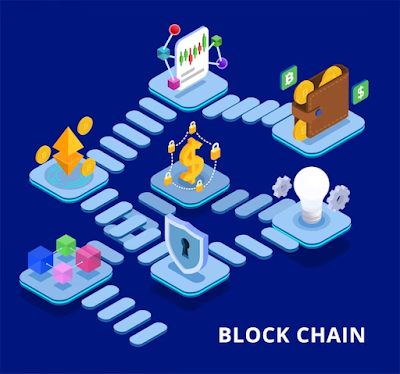Introduction
Blockchain technology has emerged as a revolutionary force, disrupting various industries with its transparency, security, and decentralization features. As we approach 2024, the blockchain landscape continues to evolve, driven by innovations and advancements. In this article, we will explore the top blockchain platforms that are poised to shape the future and discuss why businesses may need to hire blockchain developers to stay competitive in this dynamic ecosystem.
The Evolution of Blockchain Development
Before we delve into the specific blockchain platforms, it's essential to understand the evolving nature of blockchain development. Over the years, blockchain has transitioned from being primarily associated with cryptocurrencies to a versatile technology with numerous applications across diverse sectors, including finance, supply chain, healthcare, and more.
Blockchain development is the process of creating and maintaining blockchain networks and applications. It involves designing, coding, testing, and deploying blockchain solutions. With the growing complexity of blockchain projects, businesses are increasingly recognizing the importance of hiring skilled blockchain developers to navigate this evolving landscape.
The Top Blockchain Platforms Shaping 2024 and Beyond
Let's take a closer look at some of the leading future blockchain platforms that are poised to make a significant impact in 2024 and beyond:
1. Ethereum 2.0
Ethereum, the second-largest cryptocurrency by market capitalization, is undergoing a major upgrade with Ethereum 2.0. This transition to a proof-of-stake consensus mechanism promises scalability, lower energy consumption, and increased security. Ethereum's smart contract capabilities make it a preferred choice for decentralized applications (DApps) and DeFi projects. Hiring blockchain developers proficient in Ethereum is crucial for businesses looking to tap into this ecosystem.
Key Features of Ethereum 2.0:
Proof-of-stake (PoS) consensus
Enhanced scalability through shard chains
Improved energy efficiency
Robust smart contract capabilities
2. Binance Smart Chain
Binance Smart Chain has gained significant traction as a cost-effective and efficient blockchain platform. It offers compatibility with Ethereum, making it easier for developers to migrate existing DApps. With its high throughput and low transaction fees, Binance Smart Chain is attracting DeFi projects and NFT marketplaces. Companies seeking to leverage this platform may consider hiring blockchain developers with experience in Binance Smart Chain development.
Key Advantages of Binance Smart Chain:
Low transaction fees
Fast confirmation times
Ethereum compatibility
Growing DeFi ecosystem
3. Polkadot
Polkadot is an interoperable blockchain platform that enables different blockchains to communicate and share data. Its unique parachain architecture allows for custom blockchains and enhanced scalability. Polkadot is set to become a hub for cross-chain communication, making it a compelling choice for projects that require interoperability. Hiring blockchain developers with expertise in Polkadot can open up opportunities for businesses in this ecosystem.
Notable Features of Polkadot:
Interoperable network of para chains
Customizable blockchains
Scalability through parallel processing
Cross-chain data sharing
4. Cardano
Cardano is known for its focus on sustainability, scalability, and research-driven development. With the launch of smart contracts on the Alonzo upgrade, Cardano is becoming a strong contender in the DeFi and DApp space. Hiring blockchain developers skilled in Cardano's Plutus smart contract language is essential for businesses eyeing this platform for their projects.
Highlights of Cardano's Alonzo Upgrade:
Smart contract functionality
Enhanced scalability
Research-driven development
Sustainable blockchain governance
5. Solana
Solana has gained recognition for its high-performance blockchain, capable of handling thousands of transactions per second. Its fast confirmation times and low fees make it attractive for projects that require speed and scalability. Hiring blockchain developers well-versed in Solana's programming language, Rust, can give companies a competitive edge on this platform.
Solana's Key Strengths:
High transaction throughput
Low latency
Low transaction costs
Support for Rust programming language
Why Businesses Need to Hire Blockchain Developers
The blockchain landscape is evolving rapidly, and to stay competitive, businesses should consider hiring blockchain developers for the following reasons:
1. Expertise in Platform-specific Development
Different blockchain platforms have unique features, programming languages, and development tools. Hire blockchain developers with expertise in a specific platform ensures that your project is developed efficiently and takes full advantage of the platform's capabilities.
2. Customization and Security
Blockchain development requires a deep understanding of security protocols and best practices. Skilled blockchain developers can customize your project to meet your specific security needs, protecting your data and assets from potential threats.
3. Keeping Up with Upgrades
Blockchain platforms frequently release upgrades and improvements. Hiring blockchain developers who stay up-to-date with platform changes ensures that your project remains compatible and benefits from the latest features.
4. Efficiency and Timeliness
Experienced blockchain developers can streamline the development process, reducing costs and project timelines. Their expertise can help you navigate potential roadblocks and deliver your project on schedule.
5. Competitive Advantage
In a crowded market, having a well-executed blockchain project can set your business apart. Hiring blockchain developers can give you the edge needed to succeed in your industry.
Conclusion
As we approach 2024, blockchain technology continues to evolve, offering innovative solutions for various industries. Ethereum 2.0, Binance Smart Chain, Polkadot, Cardano, and Solana are among the top blockchain platforms shaping the future. To harness the potential of these platforms, businesses must consider hiring blockchain developers who specialize in the respective technologies. This strategic investment in talent will enable companies to stay competitive and thrive in the dynamic world of blockchain development.
In conclusion, blockchain development is no longer a choice but a necessity for businesses looking to thrive in the digital age. Whether you are exploring Ethereum's smart contracts, building on Binance Smart Chain, venturing into the interoperable world of Polkadot, or leveraging the high performance of Solana, hiring blockchain developers will be the key to unlocking the full potential of these blockchain platforms in 2024 and beyond.
As the blockchain landscape continues to evolve, staying informed about emerging platforms and technologies will be essential for businesses seeking to remain at the forefront of innovation and competition.


.jfif)

